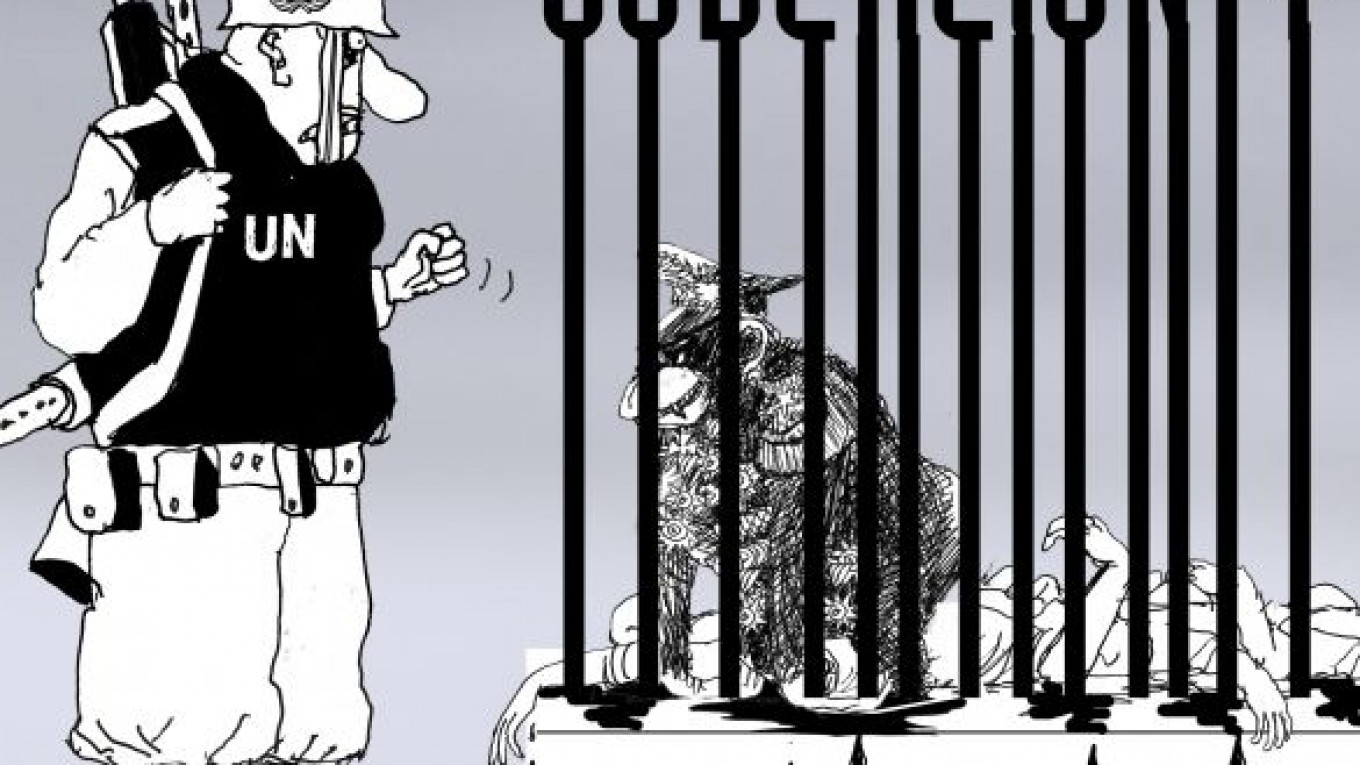Heavy turbulence in North Africa and the Middle East has forced us to rethink a number of international norms. In recent weeks the kleptocratic regime of Libyan leader Moammar Gadhafi has killed at least 4,000 of its own citizens, apparently not without the help of foreign mercenaries. Clinical delusion of grandeur is a common psychological ailment that cripples dictators who have been in power for more than 30 or 40 years. Gadhafi’s delusive disorder has reached such an acute state that he may truly believe, as he openly says, that the people still adore him — even as he kills thousands of them.
Freezing the accounts held by Gadhafi and his family is a sign of progress when compared with the way similar measures were implemented against the rulers of Tunisia and Egypt only after they had been overthrown and fled abroad. But I ask Western presidents and bankers: Don’t you harbor similar doubts as to whether Yemeni President Ali Abdullah Saleh, Syrian President Bashar al-Assad, Zimbabwe President Robert Mugabe or Myanmar strongman Than Shwe amassed their fortunes honestly? In countries where ordinary citizens eke out an existence on $2 to $3 per day, are the leaders even entitled to hold foreign bank accounts and own property in European capitals?
How bad must the leader of a developing country be before Western countries stop showering him with honors and awards? Why was Mugabe given Britain’s revered Order of the Bath? Did Gabon President Ali Bongo Ondimbo — who came to power in 2009 after his father’s 42-year rule as a dictator — really deserve the Legion of Honor award?
Closer to home, why did Russia’s St. Andrew’s Foundation — headed by Russian Railways chief Vladimir Yakunin, the Kremlin’s model “Orthodox businessman” — award Yemeni dictator Saleh its International Prize of the Holy Apostle Andrew?
Saleh was honored for his contributions to the notion of “dialogue among civilizations” (intended to be an alternative to the “clash of civilizations”) in 2004, the year marking the 10-year anniversary of the civil war in Yemen that Saleh had started — one that took the lives of more than 10,000 people. If Yakunin simply didn’t know these minor incriminating details about Saleh, perhaps the Foreign Ministry should have warned him.
Dictatorial regimes around the world that plunder and suppress their own people will weaken in the coming years. Gabon, Myanmar, Nigeria, Sudan, Syria, Yemen and Zimbabwe are the most fragile links in the international system. Their rulers will stop at nothing in the struggle to preserve their power and wealth. Although a repeat of the genocide that occurred in Rwanda and Darfur is unlikely, similar but smaller-scale conflicts on non-ethnic grounds might very well break out in the next few years.
It is time for Russia and the West to recognize that the dictators of kleptocratic regimes are the main threat to international stability. The Soviet Union and the United States were once united in supporting colonial peoples in their struggle for independence. Of course, they had geopolitical motivations for promoting the collapse of European empires, but the opportunity for cooperation remains. Russia’s leadership was once upset over NATO intervention in Kosovo, but Moscow lost the right to condemn the United States after its own aggression in South Ossetia and Abkhazia during and after the 2008 Russia-Georgia war.
Russia and the other global powers must take the lead and stop governments from carrying out genocides against their own ethnic minorities who, along with the population at large, are rising up and protesting the government’s egregious abuses of human rights. Almost 40 years ago, on Nov. 2, 1972, Article 6 of UN Resolution 2908 recognized “the legitimacy of the struggle of the colonial peoples and peoples under alien domination to exercise their right to self-determination and independence by all the necessary means at their disposal.”
The time has come to frame a similar resolution in support of people struggling against governments willing to kill thousands of their own citizens. The rules governing humanitarian intervention must be codified and boldly implemented wherever people have given their blood in their fight for freedom. The world should unite in providing aid and assistance to countries that have overthrown their dictators.
The international community should grant no formal recognition or accolades to rulers who gained power through revolution and war, and who use their positions to kill their people and amass billions of dollars in wealth. Today, when the abuse of power is becoming more prevalent, Russia, the United States, the European Union and other global leaders should unite forces to develop a new code of conduct for the 21st century. If this idea was discussed at U.S.-Russian summits, the “reset” in relations would produce even greater benefits than arms reductions.
Vladislav Inozemtsev is a professor of economics, director of the Moscow-based Center for Post-Industrial Studies and editor-in-chief of Svobodnaya Mysl.
A Message from The Moscow Times:
Dear readers,
We are facing unprecedented challenges. Russia's Prosecutor General's Office has designated The Moscow Times as an "undesirable" organization, criminalizing our work and putting our staff at risk of prosecution. This follows our earlier unjust labeling as a "foreign agent."
These actions are direct attempts to silence independent journalism in Russia. The authorities claim our work "discredits the decisions of the Russian leadership." We see things differently: we strive to provide accurate, unbiased reporting on Russia.
We, the journalists of The Moscow Times, refuse to be silenced. But to continue our work, we need your help.
Your support, no matter how small, makes a world of difference. If you can, please support us monthly starting from just $2. It's quick to set up, and every contribution makes a significant impact.
By supporting The Moscow Times, you're defending open, independent journalism in the face of repression. Thank you for standing with us.
Remind me later.








